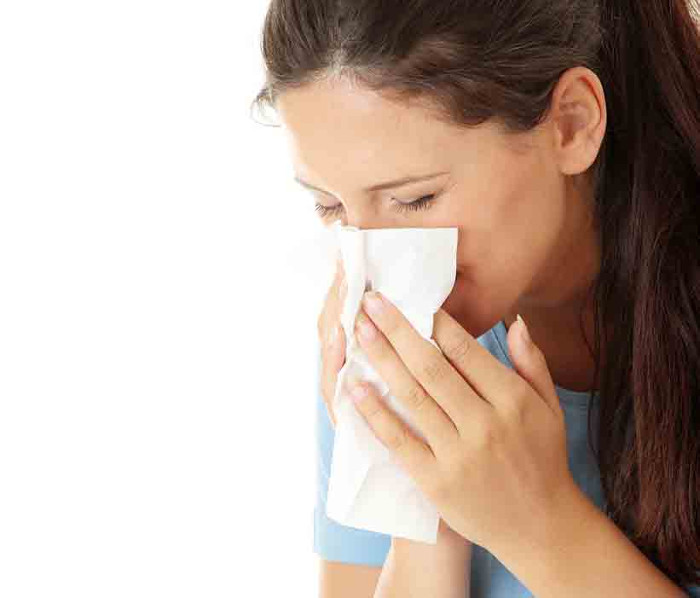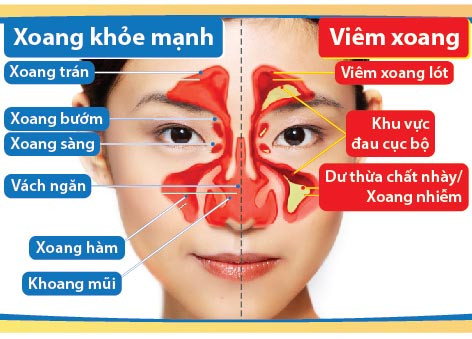How to prevent cold-season allergic rhinitis
Allergic rhinitis occurs at all ages but adults account for a higher proportion, the disease occurs all year round, but the cold, cold, rainy, wet, dry season often occurs and recur . The disease causes many troubles and discomfort for patients.
What is allergic rhinitis?
Allergic rhinitis is an inflammation of the nose, irritation caused by allergies to subjective and objective factors such as polluted environment, continuous exposure to dust, feathers, silk, changing weather, low temperature, or due to some respiratory diseases related to ENT, besides genetic factors are also factors that make rhinitis appear.
Although it is not life-threatening, allergic rhinitis causes significant discomfort for long periods of time.
What is the reason for allergic rhinitis?

Allergic rhinitis occurs at all ages but adults account for the highest percentage.
The nasal mucosa is very sensitive to the weather, especially those with allergic sites. Therefore, the cause of allergic rhinitis is mainly caused by the body's response to foreign objects (antigens or allergens) to the body, especially when the weather changes.
Some allergens are capable of causing allergic rhinitis such as dust, pollen, chemicals, cotton, fabric, fibers, fur (dogs, cats), parasites (mold spores, fleas, mites, mites) .), smoke (smoke, kitchen smoke, factory smoke), some medicines or weather (cold, sudden heat, wet, dry).
These types are very popular in our country and they often act as an incomplete antigen (Hapten) when encountering antibodies (present in the body), there will be an immediate reaction right in the mucous layer. mucosa of the nose, throat, sinuses . causes inflammation and irritation of the mucosa that is manifested as itching, sneezing.
Sneezing is a quick, sensitive reflex of the body that expels foreign objects from the mucosa that new allergens have just invaded.
On the other hand, allergic sites are closely related to allergic rhinitis, because people with allergic rhinitis that have allergic allergies (atopic dermatitis, chronic urticaria, ezcema, discus, Asthma .), the incidence is much higher than for those with allergic rhinitis without allergy.
The triggers that cause allergic rhinitis can also follow the respiratory tract but can also enter the body by other routes such as through the skin or by eating route (some foods of shrimp, crabs, snails .) .

The agents that cause allergic rhinitis.
Characteristics of allergic rhinitis
Allergic rhinitis has two types, cyclic and non-cyclic.
Cyclic types often occur suddenly when changing weather (sudden hot, rainy, moist, dry).
Patients feel spicy in the nose, sneeze continuously, itchy nose, spicy eyes, red eyes, watery eyes. Next is a lot of clear nasal discharge like water. There was a burning sensation in the throat.
Many attacks occur during the day, especially in the early morning and wake up, but at night it softens and lasts a few days to several weeks, if left untreated.
The non-cyclic allergic rhinitis has the same symptoms as the cyclic type but differs in that the disease does not appear seasonal, is not weather-dependent, the inflammation is not dramatic, only sneezes a few but stuffy nose increased and prolonged between 2 bouts.
Complications of allergic rhinitis
With chronic allergic rhinitis, nasal congestion can often occur, causing tinnitus, associated headache (these symptoms are easily mistaken for sinusitis).
Some cases of chronic allergic rhinitis can cause olfactory disorder (loss of smell) or snoring. Allergic rhinitis causes a lot of problems for patients and therefore affects the health of patients, especially when there are complications.
Untreated allergic rhinitis can lead to allergic sinusitis, nasal polyps, sinus polyps and disease or recurrence of allergic sinusitis.

Allergic rhinitis can lead to allergic sinusitis.
Principles of prevention and treatment
When suspected allergic rhinitis should be examined early for treatment from the beginning. Need to treat the cause and symptoms, however, what medicine is prescribed by the doctor, the patient should follow.
- In order to limit allergic rhinitis, do not keep dogs and cats in the house and if you cannot avoid raising them, limit your exposure to them and clean their cages and shelter.
- Periodic cleaning of blankets, sheets, pillows, cushions, upholstery and upholstery restricts the existence and growth of some parasites (mites, mites). Housing needs to be airy, cool, clean, avoid moisture to limit mold growth. The most daily oral hygiene is to brush your teeth after eating, before and after waking up.
- Need to quit smoking, pipe tobacco. Avoid or limit contact with dust (indoor dust and dirt off the road). Therefore, it is necessary to wear a mask when cleaning the house and at the street. During the seasons, the weather changes from hot to cold especially in people with allergy, need to keep the body warm (wearing warm enough, neck should be wrapped warm, limbs need to wear, hot bath ).
- 5 ways to prevent allergic rhinitis when changing seasons
- Allergic rhinitis: Causes, symptoms and treatment
- Machine for treating allergic rhinitis
- Method or treatment of rhinitis, throat
- Canopy typhoid - a medicine to treat allergic rhinitis
- Learn and prevent common diseases in the spring
- Skin diseases in the cold season are easy to relapse
- Find out how to prevent a cold in the winter
- How to treat colds and colds
- Differentiate common respiratory diseases
- Cold weather, how many times a week is bathing?
- Why does the cold season always hurt more than usual?
 Green tea cleans teeth better than mouthwash?
Green tea cleans teeth better than mouthwash? Death kiss: This is why you should not let anyone kiss your baby's lips
Death kiss: This is why you should not let anyone kiss your baby's lips What is salmonellosis?
What is salmonellosis? Caution should be exercised when using aloe vera through eating and drinking
Caution should be exercised when using aloe vera through eating and drinking